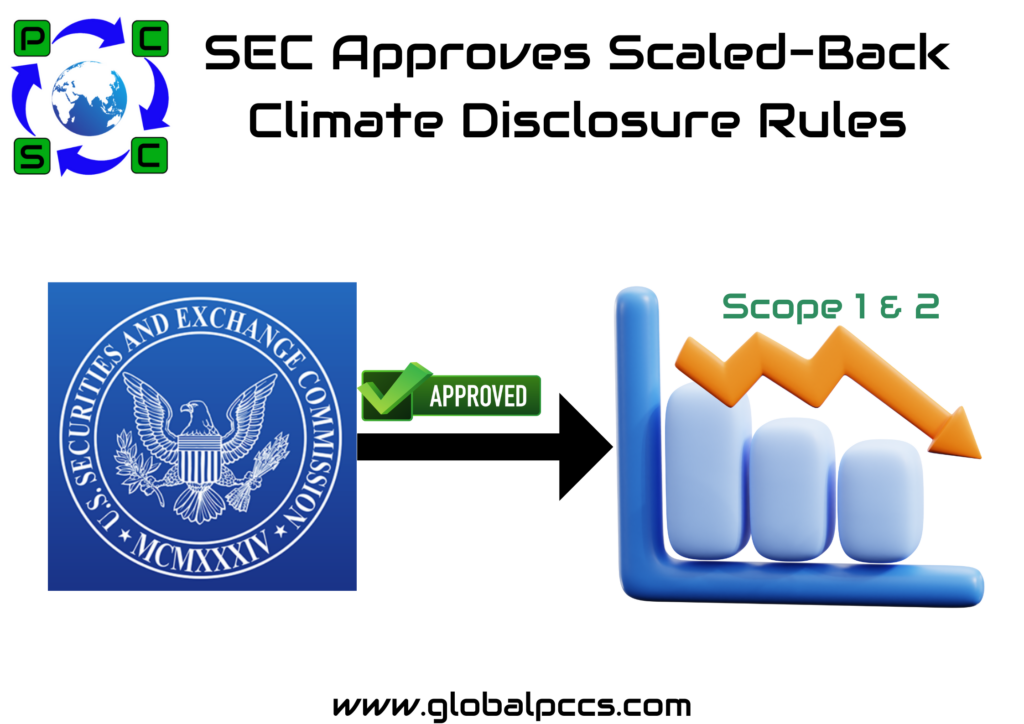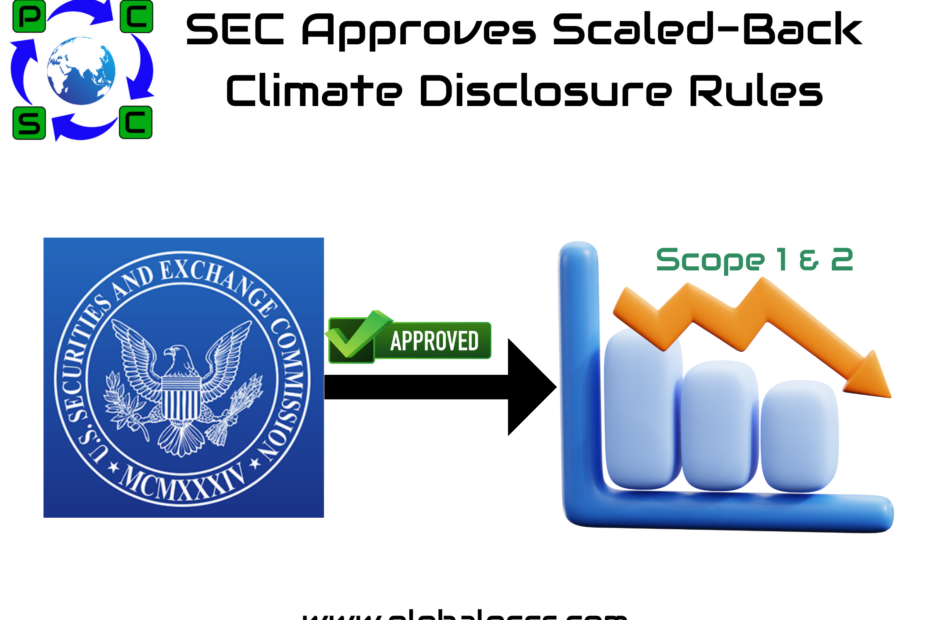 The U.S. Securities and Exchange Commission (SEC) announced today the approval of its long-awaited climate-related disclosure rules for U.S. public companies, requiring companies for the first time to provide information in annual reports and registration statements on climate risks facing their businesses, plans to address those risks, the financial impact of severe weather events, and, in some cases, greenhouse gas emissions originating from their operations.
The U.S. Securities and Exchange Commission (SEC) announced today the approval of its long-awaited climate-related disclosure rules for U.S. public companies, requiring companies for the first time to provide information in annual reports and registration statements on climate risks facing their businesses, plans to address those risks, the financial impact of severe weather events, and, in some cases, greenhouse gas emissions originating from their operations.
While marking a major milestone in the growing movement for companies to provide sustainability-related reporting, the finalized SEC rule significantly scales back the requirements of the SEC’s initial proposal, most notably removing the requirement for companies to report on Scope 3 emissions, or those originating in their value chains, outside of their direct operations.
Reporting requirements under the new rules include disclosure of climate-related risks with a material impact on business strategy, operations or financials, quantitative and qualitative descriptions of material expenditures or financial impact of any plans to mitigate or adapt to climate-related risk, oversight by the board of directors of climate-related risks and management’s role in assessing and managing the risks, and any processes the company has for identifying, assessing, and managing material climate-related risks. Companies under the new rules are also required to report on expenses and losses resulting from severe weather events and other natural conditions, such as hurricanes, wildfires, floods and drought, and on the costs related to carbon offsets and renewable energy credits if they are used as a material component in the company’s plans to achieve climate-related goals.
The SEC released its proposed climate disclosure rules in March 2022, with disclosure requirements under the draft rules including information about the oversight and governance of climate-related risks by the company’s board and management, how identified climate related risks impact strategy, business model and outlook, and the process used by the company to identify, assess and manage these risks.
The initial proposal included requirements for companies to report on their Scopes 1 and 2 emissions, or those from direct operations and those created indirectly through energy purchases, respectively, as well as Scope 3 emissions for larger companies if material, or if the company has a stated emissions reduction goal that includes Scope 3.
The proposals
Disclosure requirements for companies under the proposed rules would include information about the oversight and governance of climate-related risks by the company’s board and management, how identified climate related risks impact strategy, business model and outlook, and the process used by the company to identify, assess and manage these risks.For companies that have adopted a transition plan, the rules would require a description of the plan, including the metrics and targets used to identify and manage physical and transition risks, and for companies that use scenario analysis to assess resilience to climate-related risks,
required disclosures would include information on the scenarios used including the parameters, assumptions, analytical choices and projected financial impacts from the scenarios. The rules also would require information about a company’s use of an internal carbon price, including information about the price and how it is set.
The proposals would require companies to disclose information on the impact to financial statement line items of climate-related events, such as severe weather events, and of risks related to the transition to a low carbon economy, such as regulatory, market or competitive changes.
Scope 3 emissions
One of the key issues investors and businesses were anticipating was the SEC’s treatment of companies’ Scope 3 emissions, or those beyond companies’ direct operational control, such as emissions generated by suppliers, or from customers’ use and disposal of products. The new proposals recommend requiring companies to report on Scope 3 emissions if they are material, or if the company has a stated emissions reduction goal that includes Scope 3.
Scope 3 emissions typically account for the vast majority of most companies’ climate footprint, yet they are often the most difficult to track, measure and address. In order to address these challenges, the proposals recommend exempting smaller companies from the Scope 3 reporting requirements, utilizing a longer phase-in period relative to Scope 1 and 2 disclosures, and including a safe harbor for liability for Scope 3 emissions disclosure
Scale-Back Scope 1 and 2
The implications of this reporting requirement are significant, likely leading to considerable investment in tools and services by companies to understand and track emissions across their value chains, and placing pressure on smaller organizations across supply chains to address their own impact.
One of the most significant changes is the removal of requirements by any filters to report on Scope 3 emissions. Additionally, the SEC rule scales back Scope 1 and 2 emissions requirements, which will apply only to large filers, and only when they are deemed to be material. For companies that are required to report on emissions, the rules also provide more time, allowing for reporting to be made with the second quarter financial report, instead of with the annual report.
The final rule also pushes back the timing of Scope 1 and 2 reporting, when required, to 2026, and eases and phases in assurance requirements, which will also only apply to large companies.
While the new SEC rule won’t require some companies to report Scope 1 or 2 emissions, or any companies to report Scope 3, Gensler noted that many companies will be required to disclose on these areas to comply with reporting requirements being introduced in other jurisdictions. The EU’s Corporate Sustainability Reporting Directive (CSRD), for example, extends the reporting requirements to non-European companies that generate over €150 million in the EU, and also includes Scope 3 reporting. Similarly, California Governor Gavin Newsom recently signed a bill into law which will effectively require large U.S. companies that do business in the state to disclose their full value chain emissions.








 Authorised IMDS & CDX Training & Consulting partner for
Authorised IMDS & CDX Training & Consulting partner for





